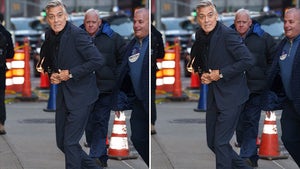Rosanne Cash Pours Emotion Into New Album
The cameras had gone, so had the crowds. Rosanne Cash had often shared morning coffee with her father in the final months of his life, so the day after he was buried, she took her Starbucks cup to his grave at sunrise to visit him alone. The world had just lost Johnny Cash, the music legend. She lost her dad.
She also lost stepmother June Carter Cash and her mother, Vivian Liberto Distin, who died last May on Rosanne's 50th birthday less than a month after being diagnosed with lung cancer.
Always an introspective songwriter as familiar with shadows as light, Cash poured her emotions into music. Her album "Black Cadillac," which goes on sale Tuesday, looks starkly at life and death and her place in one of music's most famous families.
"It's not a tribute record," she told The Associated Press. "I don't want people to think it is. It's an exploration of loss and memory and ancestry and what survives death, but it's my inner perspective."
Her family's celebrity made grief a public as well as private experience. Cash received wonderfully touching letters, and some hurtful ones, too. She'd turn on the television to see a nice tribute, then change the channel to hear people who didn't know what they were talking about speak authoritatively about her dad.
"People would come up to me in Starbucks and talk about their grief in losing Johnny Cash and start crying, when I was in mourning myself," said Cash, who lives in New York. "That was intrusive."
Writing about the experience was both compulsion and therapy.
"I lost sleep over these songs," she said. "I couldn't think about anything else. Some songs were so consuming that I couldn't function in my life until they were done."
The disc's two centerpieces explore the idea of life beyond the body. On "I Was Watching You," Cash sings from both the perspective of a soon-to-be soul watching her parents get married, and also as her dad following his passing. "Long after life," she sings. "There is love."
Cash is also comforted in "The World Unseen" by the belief that her father lives on, particularly in the memories of those he left behind. She promises to "look for you in the rhythm of my bloodstream."
Christmas Eve church services inspired her at a key moment in writing the song. Listening to the Christmas carol "We Three Kings," she scribbled words on her program, and incorporated the phrase "westward leading, still proceeding" to describe the passage into the world unseen. Cash gives the song a muted, intimate reading at least partly because she recorded it in one take at midnight after flying to Los Angeles for her first session with producer Bill Bottrell.
The title cut, with imagery of a casket driven away in a black Cadillac, is spooky because it was written six weeks BEFORE June Carter Cash began the parade of funerals.
"I'm not the first person to notice that creative efforts happen in a nonlinear way," Cash said.
Given her father's illness, it wasn't surprising these thoughts were on her mind. When she was through writing, the song filled her with a sense of foreboding.
The burbling music is inspired by the Doors crossed with early U2, with surrealistic trumpets quoting her father's "Ring of Fire."
Moviegoers have seen a depiction of Rosanne in "Walk the Line," mostly as a scared little girl watching her father's drug abuse and splintering marriage to her mother. Unlike Cash's sister, Kathy, who complained the film portrayed her mother as a shrew, Rosanne said it was an accurate portrait of a woman simply fighting to save her family.
Although she later made peace with her father's behavior, her song "Burn Down This Town" shows some scars. During his infrequent visits home, her father liked to set fires on their property; one got so wild their house almost ignited.
"My dad was always gone and we felt so isolated," she said. "I thought, don't stop at the hillside, just burn the whole town down. Burn my childhood while you're at it."
It's not her angriest song, though. Told she had a month to write something else after her mother died, Cash responded with "Like Fugitives," which lashes out most directly at religion.
Cash remains bitter at how her mother, a Catholic, was shunned by her church for many years after her divorce. And many supposedly religious people sent Cash angry mail after she spoke out against the Iraq war. Your God-fearing daddy would be ashamed, they wrote, "not realizing that he was as opposed to it as I was," she said.
"I didn't want to believe in their God that punitive, vengeful, angry guy," she said. "That's not the God that I believe in and I resent people trying to project their God into my life."
She's proud of the work. The album was half-produced by Bottrell and half by her husband, John Leventhal, but so seamlessly that most listeners won't be able to tell the difference. She figures many music fans her age even those who don't come from a famous family will relate to the emotions of losing parents.
"The paradox of it is that this is a record I want so much to share with my parents," she said, "to say, look, I wrote this with a much fuller sense of who you are in my life and what my ancestry is, and to look at you before I was born. And yet I can't share this with you.
"That's a point of real sadness for me," she said, "although part of me knows that they know."




